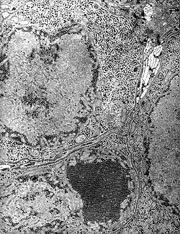Encephalitis: Symptoms, Causes,
Treatment and More

St. Louis encephalitis (SLE) virus seen in a mosquito salivary gland, is normally transmitted to humans though the bite of a Culex mosquito.
|
Encephalitis is the infection and inflammation of the brain, usually as a result of a viral infection. The disease can be potentially fatal, but this is very rare.
There are two forms of encephalitis: Primary encephalitis and secondary encephalitis.
- Primary encephalitis occurs when a virus directly invades the brain and spinal cord.
- Secondary encephalitis occurs when a virus first caused an infection elsewhere in the body and then (as a complication) infects the brain.
CAUSES
- HERPES SIMPLEX VIRUS (HSV)
There are two types of HSV, namely HSV-1 and HSV-2. HSV-1 commonly causes cold sores around the mouth. HSV-2 causes genital sores. HSV-1 is the most fatal cause of encephalitis, with a death rate as high as 60%
- VARICELLA ZOSTER (VZ)
The VZ virus causes chickenpox and shingles. It can cause encephalitis in adults and children, but it tends to be mild.
- MUMPS, MEASLES AND RUBELLA VIRUSES
These common childhood viruses can cause encephalitis.
- ARBOVIRUSES
Arboviruses are viruses that are transmitted by mosquitoes. Birds sometimes become infected with encephalitis. Mosquitoes primarily feed on birds and if they do feed on an infected bird, the mosquito becomes a life-long carrier of the disease. When the carrier mosquito feeds on humans (its secondary food source) they infect the human with the virus.
SIGNS AND SYMPTOMS
Encephalitis symptoms, in mild cases, mimic flu symptoms:
- Mild fever
- Mild headache
- Fatigue
- Sore throat
- Sore muscles (back and neck)
- Irritability
In more serious cases the above symptoms also include one or more of the following:
- Drowsiness
- Confusion and disorientation
- Seizures
- Very high fever
- Severe headache
- Nausea and vomiting
- Very stiff neck
- Visual sensitivity to light
- Muscle weakness
- Unresponsiveness
RISK FACTORS
- Age: Encephalitis tends to be more severe in the very young and the elderly. However, it should be remembered that anyone could get the disease.
- Immune system: People with weakened immune systems are more susceptible to viruses and consequently encephalitis.
- Geographic region: People who live in or visit countries or regions where mosquito transmitted encephalitis occur, are more at risk.
- Season: Mosquitoes are active in the warm seasons (spring and summer), so mosquito born infections are more prevalent during these seasons.
TESTS AND DIAGNOSIS
- Spinal tap:
A spinal tap is done to analyze the cerebrospinal fluid that surrounds the brain and spinal cord. During this procedure a needle is inserted into your lower spine and a sample of this fluid is extracted. The fluid sample is sent for laboratory analysis, which may reveal an increased white blood count. (Elevated white blood counts are indicative of an infection.)
- EEG:
An EEG measures the electrical waves sent out by the brain. Small electrodes are attached to the scalp. The electrodes measure the electrical brain activity and send them to the EEG machine, which records the brain waves on a sheet of paper. An abnormal EEG result may suggest encephalitis.
- Brain imaging:
A CT scan or MRI could reveal brain swelling. If encephalitis is suspected, a doctor will usually first do an MRI before doing a spinal tap.
- Brain biopsy:
During this procedure the doctor will take a small sample of the brain for lab analysis. This is done only in extreme cases, where other tests have delivered inconclusive results.
TREATMENT
Viral encephalitis is usually treated symptomatically, because viruses do not respond to antibiotics.
- Acetaminophen (Tylenol) can be used to relieve pain and fever.
- Anti-inflammatory medication could help reduce swelling.
- Lots of bed rest and fluids are also recommended.
Encephalitis caused by HSV and VZ usually respond very well to antiviral medication.
Herpes encephalitis can cause rapid death if it is not recognized and treated promptly. If a doctor suspects herpes encephalitis, treatment with antiviral medication will usually be started even before the diagnosis has been confirmed.
COMPLICATIONS
Severe encephalitis can cause breathing difficulties, coma and death.
Patients who do recover from severe encephalitis often have complications, which could include:
- Memory loss
- An inability to speak coherently
- A lack of muscle coordination
- Paralysis
- Impaired hearing or vision
PREVENTION
There is no vaccination against encephalitis. The best way to prevent contracting the disease is to try and avoid the viruses that cause it.
- Take active steps to prevent being infected with herpes.
- Ensure that children are vaccinated against mumps, measles, rubella and chickenpox.
- Take steps to reduce mosquitoes in and around your home.
- Protect yourself and your family against mosquito bites.
- Early treatment of viral infections could significantly reduce the risk of developing secondary encephalitis.
WHEN TO CALL A DOCTOR
- A fever higher then 38.8ºC is always an emergency.
- People who show signs of unusual mental disturbance such as altered levels of consciousness, impaired judgment, confusion, personality changes etc. should immediately be taken to an emergency room.
PROGNOSIS (OUTLOOK)
Most cases of encephalitis are mild and may even go unnoticed. Timely treatment of severe encephalitis is important — this could mean the difference between life and death. In general, most people recover from encephalitis without any severe or lasting complications.
Copyright 2009: Remedium. This article may not be copied, in whole or in part, without the written consent of Remedium.
|
